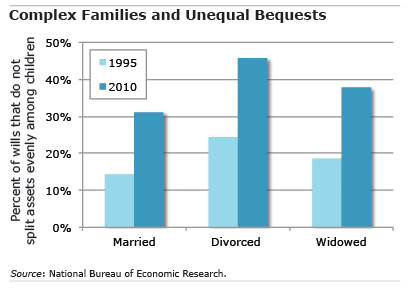As the American family becomes increasingly complex, so do parents’ wills.
The result has been a dramatic increase over the past two decades in the share of wills in which parents distribute their estate’s assets unequally among their genetic offspring and stepchildren.

New research , based on surveys of older Americans, finds that about one-third of parents today do not distribute their assets equally. The reasons range from the greater incidence of divorce and the inherent disadvantage of being a stepchild to the fact that some children naturally take on the role of caring for their aging parents. With parents now living longer and needing more care, children may receive compensation in the will for providing that care.
About 42 percent of older parents have not written a will, though it’s unclear why, according to the study.
But when there is a will, here is how complexity affects the distribution of bequests, based on the research findings:
Equal bequests remain dominant in traditional families in which biological offspring have maintained contact with their aging parents. But in the growing ranks of complex families, the researchers found “substantial” differences in their bequests.


